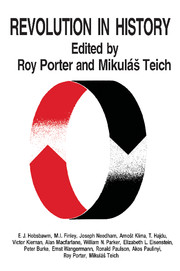Book contents
- Frontmatter
- Contents
- Notes on contributors
- Introduction
- 1 Revolution
- 2 Revolution in antiquity
- 3 Social devolution and revolution: Ta Thung and Thai Phing
- 4 The bourgeois revolution of 1848–9 in Central Europe
- 5 Socialist revolution in Central Europe, 1917–21
- 6 Imperialism and revolution
- 7 Socio-economic revolution in England and the origin of the modern world
- 8 Agrarian and industrial revolutions
- 9 On revolution and the printed word
- 10 Revolution in popular culture
- 11 Revolution in music – music in revolution
- 12 Revolution and the visual arts
- 13 Revolution and technology
- 14 The scientific revolution: a spoke in the wheel?
- 15 The scientific-technical revolution: an historical event in the twentieth century
- Index
2 - Revolution in antiquity
Published online by Cambridge University Press: 05 February 2015
- Frontmatter
- Contents
- Notes on contributors
- Introduction
- 1 Revolution
- 2 Revolution in antiquity
- 3 Social devolution and revolution: Ta Thung and Thai Phing
- 4 The bourgeois revolution of 1848–9 in Central Europe
- 5 Socialist revolution in Central Europe, 1917–21
- 6 Imperialism and revolution
- 7 Socio-economic revolution in England and the origin of the modern world
- 8 Agrarian and industrial revolutions
- 9 On revolution and the printed word
- 10 Revolution in popular culture
- 11 Revolution in music – music in revolution
- 12 Revolution and the visual arts
- 13 Revolution and technology
- 14 The scientific revolution: a spoke in the wheel?
- 15 The scientific-technical revolution: an historical event in the twentieth century
- Index
Summary
Revolution is one of a class of words widely employed without definition both in current speech and in professional historical and sociological writings, with a great (and even mutually) contradictory variety of meanings, and yet often (though by no means always) with sufficient intelligibility. That provides the rationale for this book. Much of it is devoted to the effort to clarify the ways in which the same word can range in meaning from, say, Copernicus's Of the Revolutions of the Heavenly Spheres through the Agricultural or Industrial Revolution to the American War of Independence and the Russian Revolution. The concern of this essay is narrow, namely, the use and abuse of the concept in the study of ancient (classical) history, where restriction to the political sense is traditional, so that many of the issues raised by such notions as a Scientific Revolution do not arise.
Failure to define terms and concepts is a well-known curse in historiography. But definitions do not solve problems. They are either useful or not useful (not either right or wrong, as seems to be widely thought). That is to say, a historian is free to define ‘revolution’ as he prefers (within limits); the question then is whether or not his choice advances our understanding of the subject on which he is discoursing. Little reflection is needed in order to reveal that at both ends of the spectrum of meanings, the term is used in a way that is not helpful. At one end, the word ‘revolution’ amounts to nothing more than a synonym for ‘change’ (or, more narrowly, for change that some people resisted, which is no more helpful). At the other end, there has developed in recent decades a view, stemming ultimately from Marx, that the term should be restricted to those moments in the history of class struggle during which a radical, violent change occurs in the class basis of the political structure.
- Type
- Chapter
- Information
- Revolution in History , pp. 47 - 60Publisher: Cambridge University PressPrint publication year: 1986
- 4
- Cited by

